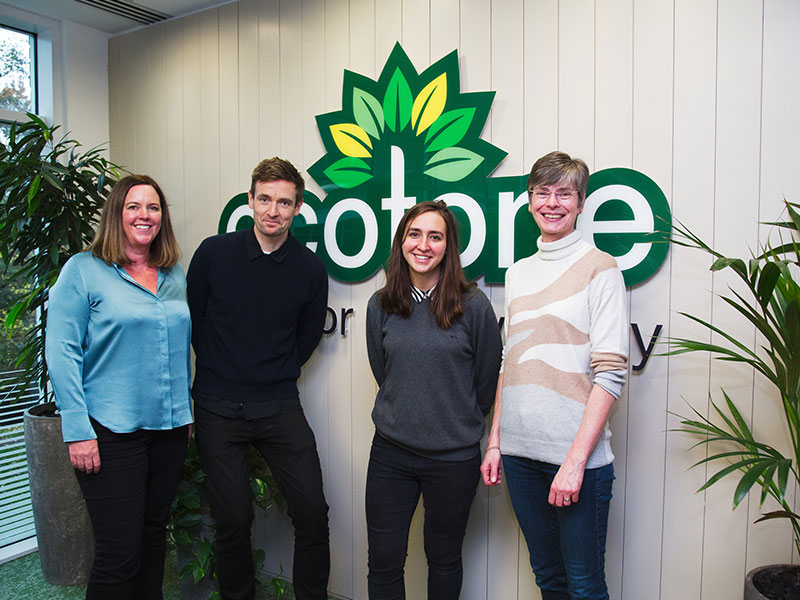As the climate crisis grows rapidly in urgency, so does the pressure on business leaders to fulfil their social responsibility.
Increasingly stakeholders, investors, and consumers are seeking to invest in or purchase goods or services from brands with a clear dedication to sustainability. The green agenda also plays a role when competing for talent, as a recent study revealed that 65% of people were more likely to work for an organisation with strong environmental policies.
Business leaders may be unsure of how to lay the foundations for a sustainable business or achieve sustainability goals without huge cost.
Here are 5 small changes to make your workplace more sustainable:
-
Debunk recycling myths
Recycling is a simple way to encourage sustainability at work in theory. In practice, however, the rules around recycling and waste disposal can be complex to navigate. Confusion around local rules and myths about what is accepted in recycling contribute to its lack of sustainable impact. The accidental disposal of low grade plastics into recycling waste, as well as food contamination from remnants left in containers, can all render batches of recycling completely useless, meaning it will likely end up in landfill.
With a recent study finding that 86% of households in the UK put one or more items in the recycling that cannot be recycled, the misconceptions around correct disposal are clear. Not only should offices and work spaces be encouraging recycling as standard practice; they should be ensuring that the workforce is educated about how to do it effectively so that their efforts are not being compromised by common mistakes. Clear labelling of waste disposal alongside clear instructions that are difficult to ignore will really maximise impact.
-
Introduce reusables
Encouraging the use of reusables is another small step that could make a real difference. Unlike single use packaging, reusables have not been created as cheaply as possible, but have been crafted with durability that is long lasting. If your workplace has a canteen or catering facility, investing in a smart reusable containers scheme and ditching the single use plastics will help reach your green goals, while also achieve measurable impact towards net zero and boost employee engagement through visible and impactful actions from the company
Reusables can still be encouraged in workplaces without on site catering. Promoting reusable lunch boxes, coffee cups and bottles and advising against single use plastic bottles and materials such as cling film will help the cultivation of a sustainable culture in the workplace, and embed sustainable practices as the norm.
-
Monitor food waste
Globally, 20-30% of food produced is wasted, contributing to around 8-10% of total man-made greenhouse gas, according to the Intergovernmental Panel on Climate Change. Adopting a proactive approach to managing food waste will help businesses move towards net zero. Educating the workforce on food waste and limiting food wasted in workspaces is a good place to start. Adopting technologies which monitor and track food waste data can also minimise company waste created. Winnnow, for example, analyses weight and composition of waste to adjust quantities purchased.
-
Assess your suppliers
If a business is trying to implement sustainable practice, but is using suppliers who are not dedicated to green practice, it can be hard to convince stakeholders and clients of a commitment to sustainability.
It is important to assess whether your suppliers have ethical practice, and also have sustainability as a priority. Discussing sustainability goals and curating a shared strategy can help establish sustainable partnerships in which all parties share the same sustainability or circularity goals. Collaborations and knowledge sharing will maximise impact.
-
Involve everyone
To make real sustainable efforts in the workplace, all staff need to be involved and sustainable thinking needs to be standard practice. Creating clear guidelines and policies surrounding sustainability and how this will be practised by the workforce will help instil sustainable thinking into all employees.
A rewards system or leaderboard could also be used to incentivise employees to achieve green goals, making it fun and interactive. Promoting green habits as everybody’s responsibility in the office can also have a wider impact as employees may start practising more sustainable habits outside of work.
Business leaders can play a vital role in building a sustainable future. By looking inwards to policies, operations and employee engagement, companies can benefit from increased staff satisfaction and engagement, improved brand reputation, and even becoming a pioneer in green practices amongst peers.
About the author
 Josephine Liang is a sustainability expert and CEO of CauliBox, the award-winning, tech-enabled reusable food and drink packaging solution for workplace and event dining. She has worked with corporations (including Unilever & Sainsburys), local authorities (Camden council) and higher educational institutes (London School of Economics) as well as numerous food enterprises such as Gail’s Bakery, Ole & Steen, and more in cutting food waste and advising on sustainable development. Josephine was awarded a special “Women in Food” award by the Mayor of London in 2019 and was named on Forbes 30 under 30 in 2021. She holds an MSc from the University of Oxford and a BA from Colby College.
Josephine Liang is a sustainability expert and CEO of CauliBox, the award-winning, tech-enabled reusable food and drink packaging solution for workplace and event dining. She has worked with corporations (including Unilever & Sainsburys), local authorities (Camden council) and higher educational institutes (London School of Economics) as well as numerous food enterprises such as Gail’s Bakery, Ole & Steen, and more in cutting food waste and advising on sustainable development. Josephine was awarded a special “Women in Food” award by the Mayor of London in 2019 and was named on Forbes 30 under 30 in 2021. She holds an MSc from the University of Oxford and a BA from Colby College.









